|
|
   
| Review: CHV-Electronics
FxPlug
Plug-Ins |
December, 2006
CHV-Electronics
FxPlug
Plug-Ins
Magic 3D FX-$65.00
Morphing FX-$65.00
www.chv-plugins.com
Review by Steve
Douglas
Christoph Vorhein and CHV Electronics has
long been at the forefront of creating high quality and inexpensive
plug-ins and animations for Final Cut Pro going back to, at least,
Final Cut Pro Version 2.0. Now we are again treated to Christoph's
latest contributions to the Final Cut Pro community with two
small collections of plug-ins, the Magic 3D FX and the Morphing
FX sets. Both bundles utilize the newest FX plug-in architecture
from Apple, which allows for higher render speeds and better
system compatibility. Having been introduced with Apple's Motion
2, it is now also available for Final Cut Pro 5.1.2.
The Magic 3D FX set consists of
three individual plug-ins. Unlike regular plug ins which are
simply dropped into your Final Cut Pro plug-ins folder, the FxPlug
sets install in your /Library/Plug-ins/FxPlug folder on your
hard drive. The first of these three plug-ins is the Matrix 3D
which enables you to create a grid of up to 40 different video
clips on it. It was easy to set up and use. In fact, I was playing
with the possibilities for so long that I missed the first quarter
of the Chargers winning football game. My how time flies! There
are literally hundreds of different grid variations you can create
and, while I only experimented with 5-7 different clips, there
are countless ideas that one can come up with when utilizing
the Matrix 3D plug-in. The plug-in also comes with the ability
to create waves from both from side to side and from back to
front. The short owners manual explains everything clearly but
this plug-in is fairly intuitive and reference to it came as
only an after thought.
Your imagination
pays off well with the Matrix 3D. Note how in the fourth picture,
the image can be placed over another matte, gradient or animation.
The second effect in this set is the filmstrip plug-in which
has a myriad number of uses while placing up to 4 separate clips
in the wells. Size, side textures, movement relating to a variety
of twists and turns and adjustments of the X, Y and Z axis can
adjust all these filmstrips. The ease of use remains consistent
and the rendering time of the default 10-second clip was roughly
4 minutes on my DP G5, 2 gigs of ram and the Radeon 9800 Pro
graphics card.
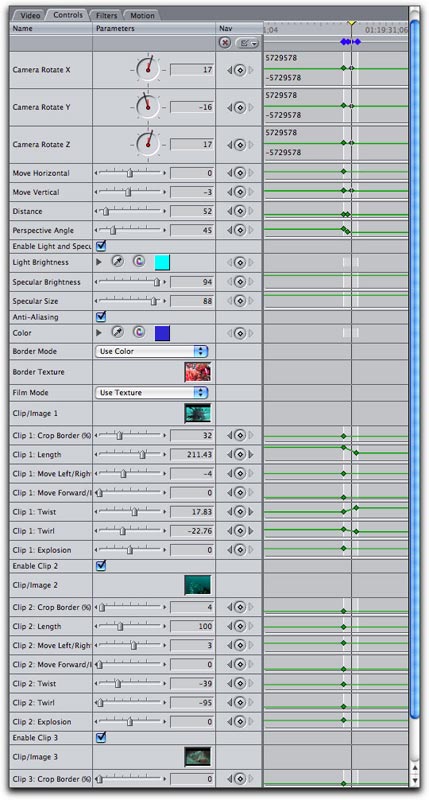
Film Strip FX Plug-in
parameters were simple to manipulate.
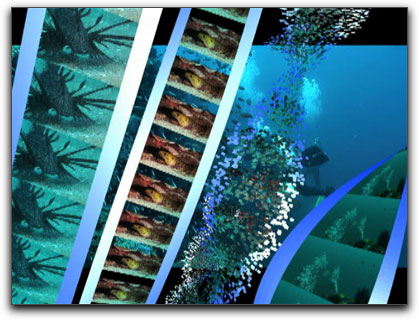
Have your strips twist, curl or explode. It's up to you and easy to do.
The last FX plug-in in the Magic 3D collection is the Cube FX
and the sky is the limit in terms of what you and your cube can
do. A video well is there for each side, top and bottom. Spin
it, turn it on any axis or bring the sides together or apart;
it's your decision and not difficult to do. With any of the Magic
3D Fx plug-ins you will, unfortunately, not be able to place
text into the video wells. To do so will freeze up the plug in
which will un-freeze the moment you clear the well of text. This
happens when you place any video generator into an image well.
As was explained to me, "This is not a fault of the plug-in
itself. It's a problem of FCP". If you put a video generator
into an image well, the plug-in won't even be executed anymore.....
And without being executed, the plug-in can't do a thing... which
is why everything will freeze up. Apple already has said: "SOME
Fx plug-ins will work with FCP 5.1.2". There are also some
functions of the plug-in interface missing, that are working
perfectly with Motion, but not at all with FCP."
You can spend a lot of time just deciding which clips should go in which well. Either way, it's fun to use.
The second set of CHV FX Plug-ins consist of two separate Morphing
tools, one is the Morph plug-in and the other the Deform Fx.
Deform makes it possible to distort stills and video clips by
taking advantage of Final Cut Pro's new Fx plug-in interface
structure. Both plug-ins in the Morphing Fx package are fully
capable of running in real-time without the need to wait for
rendering. While both can be found in the Final Cut Pro effects
bin, as of this writing, they will only be able to work in Motion
2. Transparency is fully supported so that you will be able to
distort images without an active alpha-channel. The Deform plug
in can be applied to both stills and video with the easy to follow
manual. It is a bit funky for my tastes but would probably be
just the thing for someone wanting to make a Halloween video
or the next installment of Nightmare on Elm Street, Part 14,
'The Final Finale'.
Turning a cute little blennie into something warped. Just plain weird if you ask me.
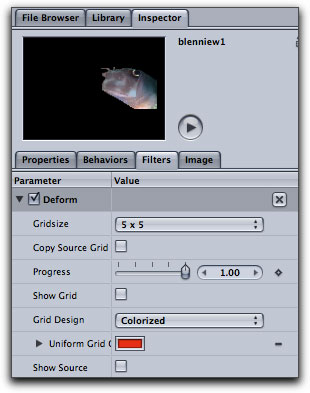
A simple set of parameter
controls allows you to
bend, shape and manipulate your images or video clips all retaining
their transparency.
The Morphing Fx plug-in will surely be of greater use enabling
you to morph faces into other faces, buildings into other buildings
or animals into other animals. This new version is made easier
to apply and check through the use of the progress bar, which
demonstrates the current morph and easily enables you to clearly
see any places or points that need tweaking. After setting your
source and destination clips or stills you must apply points
to the destination clip in a similar way as those you applied
on the source clip. It is time consuming and I wish there were
a better way to recall which points from the source clip should
be applied to the destination clip. This is especially so when
you have chosen a larger grid size to work with depending upon
the complexity of the image to be morphed. I repeatedly had to
shift back to the source to recall where it should be placed
on the destination. By the time you read this, marker numbers
will be available in a free update and this should certainly
help my senile memory. Never the less, it all worked just great
and I wish I had had this plug in last year when I was working
on a project that demanded a critical morphing sequence.
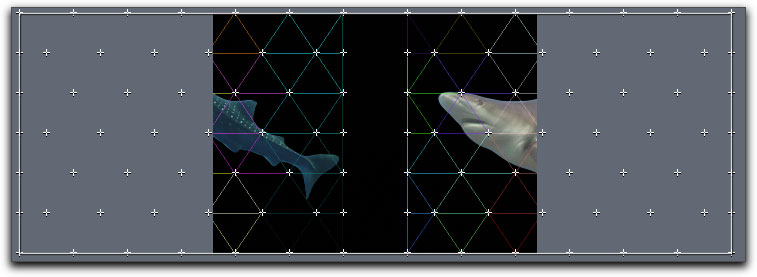
The source clip on
the left with the destination clip on the right.
Once you place the crosshair points on the source image you will
need to do so, as well, for the destination clips.
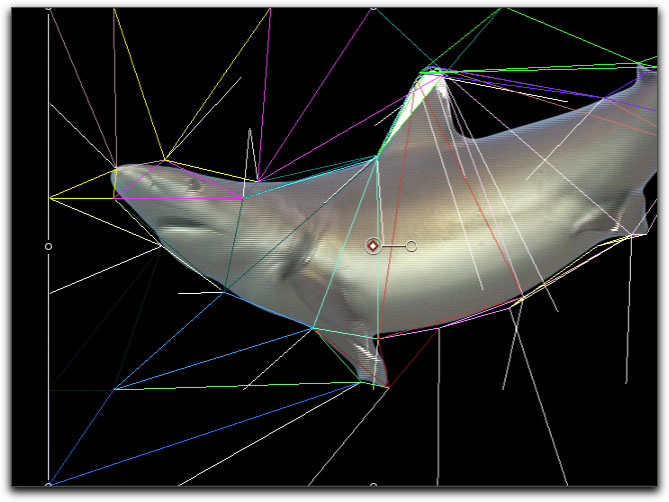
My final destination clip with points applied. The progress bar in the parameters control really helped a lot when tweaking the final morph.
And finally a plug in that I couldn't resist mentioning. Who
doesn't enjoy something for free and this plug-in is just that...Free
to all. Christoph Vorhein has been offering a free plug in here
and there ever since I first discovered CHV Electronics and here
is one that I do look forward to using. He calls it the Towers
of Film and that's just what it is. The plug in creates small
cities of buildings of varying heights, quantities and angles
for viewing. Just place as many clips as you want into the many
video or still wells. You can fully adjust the camera angle so
that it is looking down from on high as if coming down to a planet
and sweep the camera in onto a city of up to 40 film clips. If
you want 500 or more buildings, you've got it. Only want a few,
you have them too. Want to look down, up; sideways...this easy
to use plug in is loaded with features. It is more than worth
its price...Oh that's right, did I say FREE?

A feature I usually like to point out
when reviewing plug-ins and applications is the availability
of a number of free tutorials on the companies website so that
the user can hit the ground running when first they purchase.
CHV Electronics has always been great at supplying on line tutorials
for the user of any of their plug- in packages. Their newly designed
website is easy to navigate and is user friendly. This is a boon
especially to the new editor who is still trying to figure out
the steps to take and the terminology that goes with it. CHV
through the years has also always offered free upgrades for any
of their plug-in sets.
With my bottom line time having just
arrived, there is not much I can say that I haven't already.
First, these plug ins work and work well, second, they can all
be quite useful in many types of projects (even the deform plug
in could be fun) and third, they produce high quality results
and are inexpensive for the editor on a budget. I think it is
a fair assumption that the purchaser of these exciting plug-ins
has little chance of ever having buyer's remorse. I don't.
This article first appeared
on www.kenstone.net and
is reprinted here with permission.
All screen captures and textual references are the property and
trademark of their creators/owners/publishers.
 Steve
Douglas is an underwater videographer and contributor to
numerous film festivals around the world. A winner of the 1999
Pacific Coast Underwater Film Competition, 2003 IVIE competition,
2004 Los Angeles Underwater Photographic competition, and the
prestigious 2005 International Beneath the Sea Film Competition,
where he also won the Stan Waterman Award for Excellence in Underwater
Videography and 'Diver of the Year', Steve was a safety diver
on the feature film "The Deep Blue Sea", contributed
footage to the Seaworld Park's Atlantis production, and a recent
History channel MegaDisaster show. Steve is one of the founding
organizers of the San Diego UnderSea Film Exhibition and leads
both underwater filming expeditions and African safaris with
upcoming excursions to Kenya, Bali & Komodo in 2007, and
Costa Rica and Palau in 2008. Feel free to contact him if you
are interested in joining Steve on any of these exciting trips.
www.worldfilmsandtravel.com Steve
Douglas is an underwater videographer and contributor to
numerous film festivals around the world. A winner of the 1999
Pacific Coast Underwater Film Competition, 2003 IVIE competition,
2004 Los Angeles Underwater Photographic competition, and the
prestigious 2005 International Beneath the Sea Film Competition,
where he also won the Stan Waterman Award for Excellence in Underwater
Videography and 'Diver of the Year', Steve was a safety diver
on the feature film "The Deep Blue Sea", contributed
footage to the Seaworld Park's Atlantis production, and a recent
History channel MegaDisaster show. Steve is one of the founding
organizers of the San Diego UnderSea Film Exhibition and leads
both underwater filming expeditions and African safaris with
upcoming excursions to Kenya, Bali & Komodo in 2007, and
Costa Rica and Palau in 2008. Feel free to contact him if you
are interested in joining Steve on any of these exciting trips.
www.worldfilmsandtravel.com
copyright ©Steve
Douglas 2006
|